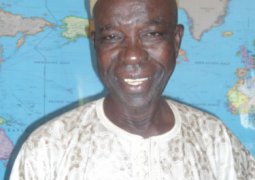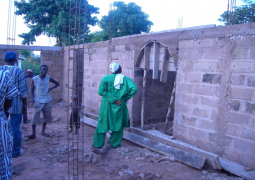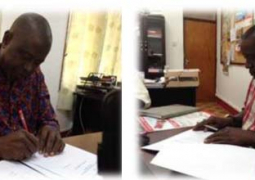The Special Criminal Court in Banjul yesterday granted former Justice Minister Lamin AMS Jobarteh his request to open his defence in the criminal trial involving him, former Solicitor General Pa Harry Jammeh and former Secretary General Dr Njogu Bah.
Jobareh earlier selected not to give evidence in his defence, but later made an application through his counsel to give evidence in his defence.
Lamin AMS Jobarteh, Pa Harry Jammeh, and Dr Njogu L. Bah, are being tried under a three-count which included conspiracy to carry out a lawful purpose by an unlawful means, giving false information to a public officer, and abuse of office; charges they denied.
Delivering the ruling on the application, Justice Nkea said the ruling arose from the application by the 1st accused to be given the opportunity to call evidence in his defense, after he had previously elected not to do so.
After the closure of the prosecution’s case, the 1st accused elected not to call evidence purely as an exercise of his section 24(8) constitutional right to remain silent as a choice made pursuant to his defence, he said.
“The 2nd and 3rd accused persons went on to lead sworn evidence at the end of which the 1st accused applied to change his mind with a view to lead evidence,” added the judge.
He said while L.K Mboge of counsel for the 3rd accused moved in support of this application, the prosecution objected to the grant of same, arguing that it would amount to gross irregularity, and would also send the wrong signal that parties could dictate the pace of criminal trials.
E. Jah of learned counsel for the 2nd accused while not opposing the application out-rightly, submitted that should the court be minded to grant the application the court should do so with a view that should any thing adverse be led against the 2nd accused in that process, the court would grant the 2nd accused the opportunity to be recalled and even to call other witnesses, he said.
To counsel Jah, he went on, the law in section 123 of the Criminal Procedure Code allowing for the recall of witnesses was very clear, and it was straight to the point that a witness may be recalled at any stage of the proceedings before judgment, if his evidence is, in the view of the court, essential in the just determination of the case.
“Having adverted my mind to sections 239 and 240 of the Criminal Procedure Code and section 24 of the Constitution, and having also carefully examined the submissions in support and in opposition to the grant of the prayer sought, it seems to me that only one issue stands out for determination in this application and that is: does the election by the 1st accused to remain silent foreclose him from subsequently calling evidence?” he asked.
He said it must be stated that there are various options available to an accused person at the close of the prosecution’s case; he may elect to give sworn evidence, or unsworn evidence, or to remain silent, or to rest his case on that of the prosecution.
Except he chooses the last option of resting his case on that of the prosecution, he was still entitled to call other witnesses, he continued.
“When an accused is standing trial alone, and selects to rest his case on that of the prosecution, or where he chooses to remain silent and does not intend to call other witnesses, there will be no difficulty, as the court may move straight to judgment, thereby foreclosing the accused from again calling evidence,” said Justice Nkea.
The difficulty, however, he added, arises when in a joint trial an accused elects to remain silent and later changes his mind and chooses to give evidence after the other accused persons have testified, as in the instant case.
“This is an uncharted area in our law as there is no case law or statutory authority to support any of the positions stated above. And from a thorough examination of the existing laws on criminal practice relevant to this trial, I noticed that neither the Criminal Procedure Code nor the Constitution of this country expressly prohibits this,” he said.
“I have not seen any other law that does. I am, therefore, inclined, under the inherent powers of this court, to give the 1st accused the benefit of the doubt, and to hold this as an extension of his fair trial rights and to reinforce his right to be heard. And this is how I shall determine the issue formulated above,” he declared.
“It is for the above reasons that I will accordingly grant the application of Mr. Touray to allow the 1st accused to now give evidence in his defence,” the judge added.




